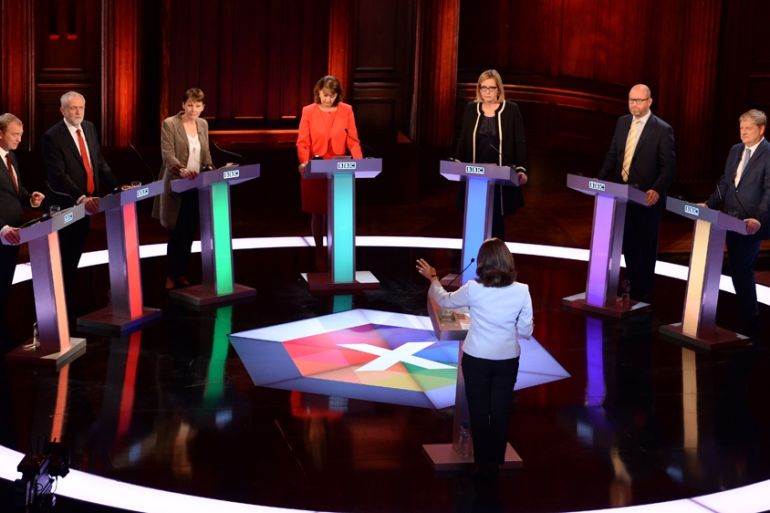UK opposition mocks May’s absence from election debate
Opposition leaders question prime minister’s absence from the BBC debate as YouGov poll shows Labour Party closing in.

UK opposition leaders have mocked Prime Minister Theresa May’s absence from a key election debate as a new poll suggested that the Conservatives could lose several seats in next week’s general election and leave the country with a hung parliament.
May had agreed to participate in a televised town hall interview broadcast by Channel 4 News and Sky on Monday on the condition that she will not be on stage at the same time as her rival.
Keep reading
list of 4 itemsThe Take: What would a third Modi term mean for India?
Israeli minister suggests reported attack on Iran was ’feeble’
Israel ‘seems determined to drag region into war’
However, the prime minister chose to send Home Secretary Amber Rudd to represent the Tories at Wednesday’s televised debate on the BBC.
“Tonight, I am here,” UK Labour Party leader Jeremy Corbyn said at the debate.
“I am here to debate the future of our country … do we want one for the many or just a few? We will ask those with the most to contribute a bit more, so no one is held back from achieving their potential.
“Vote Labour to transform Britain for the many, not the few.”
Tonight we saw the real choice facing our country. On 8 June, you have the power to decide. Vote Labour #ForTheMany, not the few. #BBCDebate pic.twitter.com/Z923oBnWnZ
— Jeremy Corbyn (@jeremycorbyn) May 31, 2017
May later defended her no-show, claiming Corbyn “ought to be paying a little more attention to thinking about Brexit negotiations”.
“That’s what I’m doing to make sure we get the best possible deal for Britain,” she said.
Liberal Democrats leader Tim Farron also took a swipe at the Tory leader for the decision, saying “you’re not worth Theresa May’s time, don’t give her yours”.
Plaid Cymru leader Leanne Wood said May was not there because “her campaign of soundbites is falling apart”.
Meanwhile, Caroline Lucas, co-leader of the Green Party, branded May’s decision not to attend “extreme cowardice” as her replacement Rudd floundered.
"Not so much Iron Lady as the u-turn queen" – decent line from Angus Robertson. Debate finishes with them all lambasting May for her absence
— Fraser Nelson (@FraserNelson) May 31, 2017
WATCH: Is the British media’s coverage of Corbyn balanced or biased?
The debate itself was a boisterous affair covering Brexit, the economy, public services, climate change, immigration and security – a major issue after the Manchester attack last week.
Speaking on security, UKIP leader Paul Nuttall said while British foreign policy in Iraq and Libya was “fundamentally wrong”, it was not to blame for the attack in Manchester that killed 22 people.
Nuttall said “radical Islam” was “a cancer that needed to be cut out” to prevent other attacks.
Asked whether he would arrest suspected “terrorists” without trial, he said: “I’ve said nothing should be taken off the table.”
Corbyn said he “utterly deplored” Nuttall’s “subliminal attack on people of the Muslim faith” after the anti-EU party leader accused the Muslim community of not doing enough to report “extremism”.
“We have to recognise that we live in a multi-faith society,” Corbyn said.
Nuttall’s remarks were also condemned by SNP Deputy leader Angus Robertson who pointed out that a white neo-Nazi was responsible for the murder of MP Jo Cox.
When campaigning for the June 8 snap parliamentary election began last month, polls showed the Conservatives to be 20 points ahead of Labour. Since then, several missteps by May have thrown the contest into uncertainty.
According to a YouGov Poll for The Times newspaper on Wednesday, Labour is projected to gain about 30 seats, and the Conservatives are likely to lose about 20, putting the Tories 16 seats short of a majority in parliament.
The Times said the main projection from YouGov’s model “allows for a wide margin of error, [but] would be a catastrophic outcome for May, who called the election when polls pointed to a landslide result”.
“Her support appears to have plunged after the poor reception of the party manifesto, including plans to make more elderly voters pay for home care,” the newspaper said.
|
|